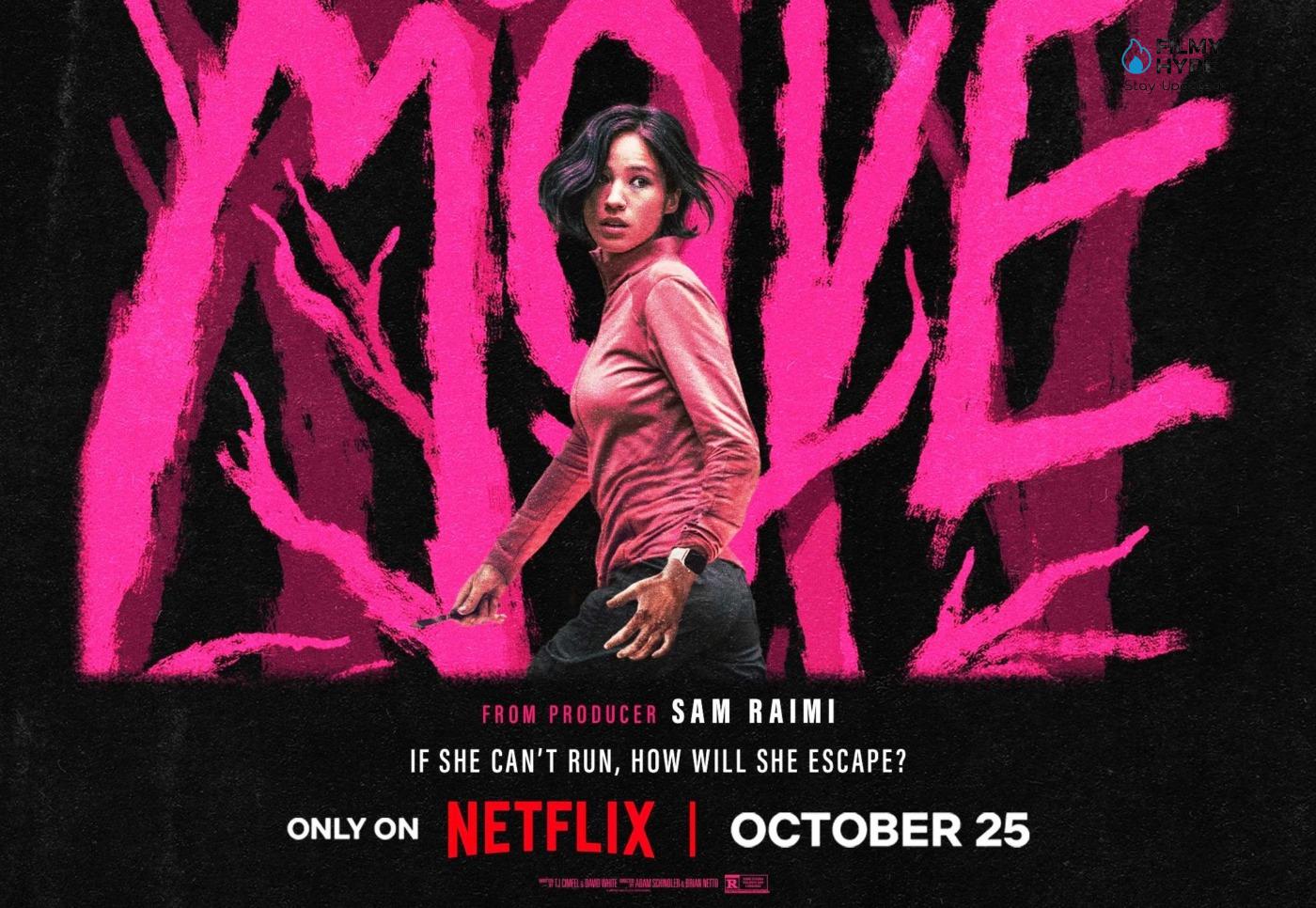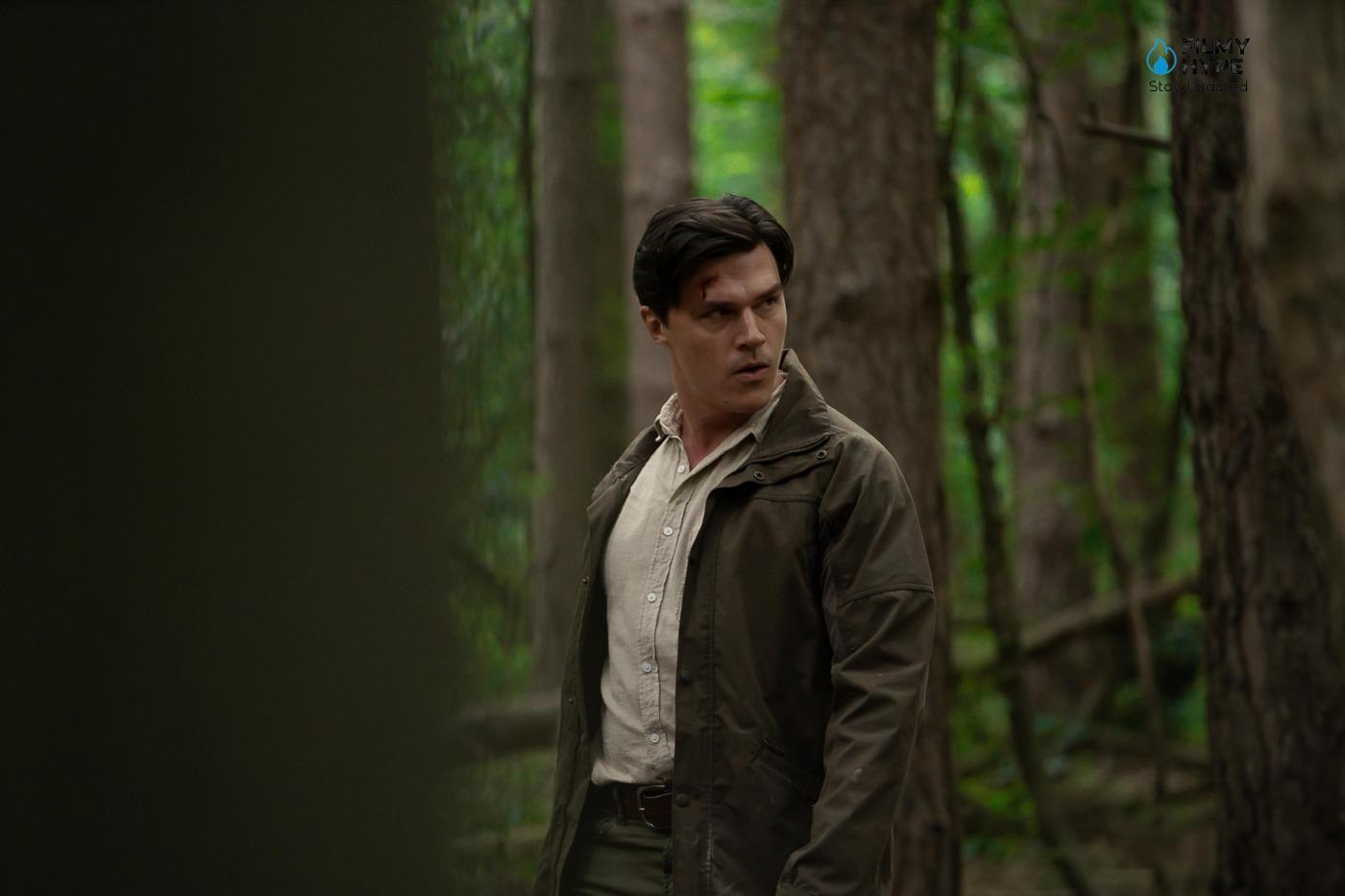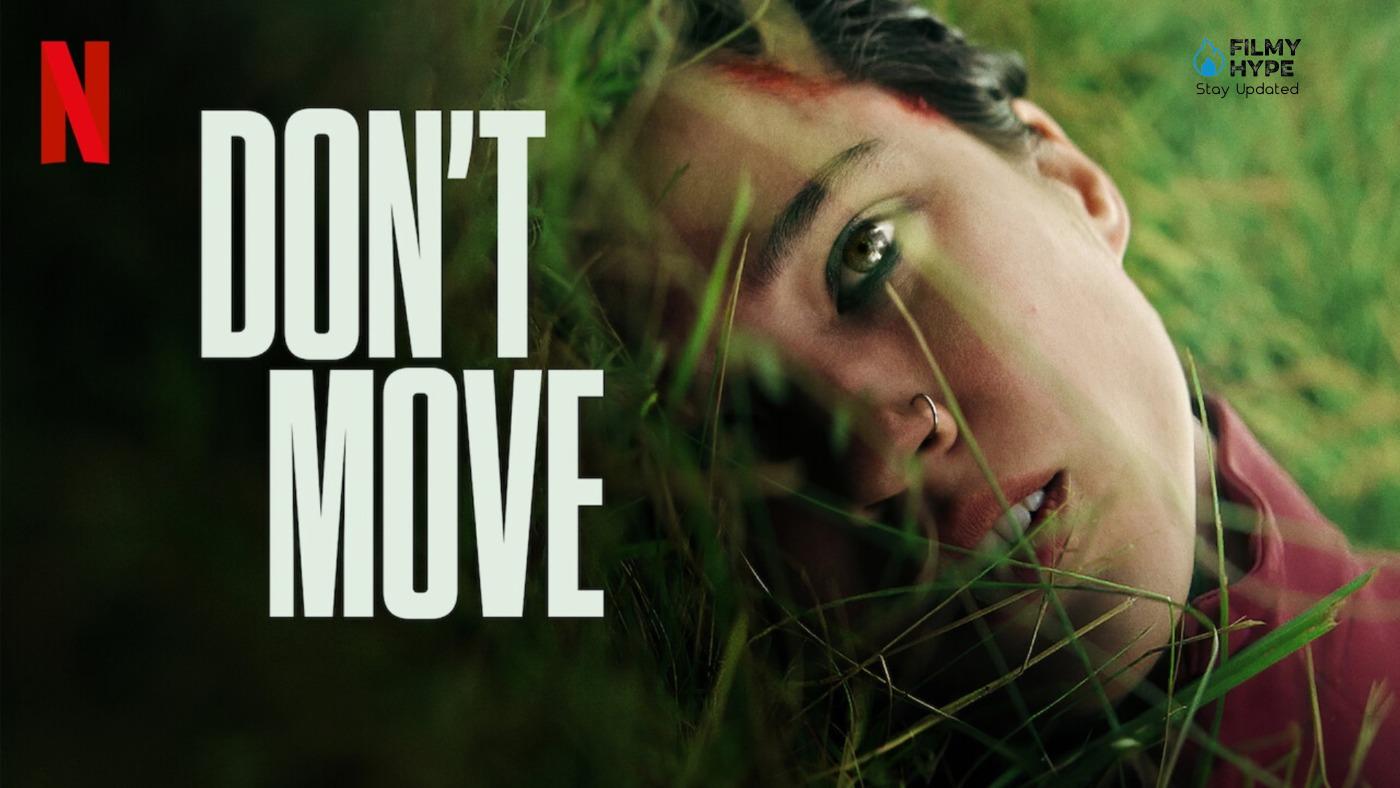Don’t Move Movie Review: Netflix’s Captivating Thriller That Will Hold You in Its Grip
Cast: Finn Wittrock, Kelsey Asbille
Directors: Adam Schindler and Brian Netto
Streaming Platform: Netflix
Filmyhype.com Ratings: 3.5/5 (three and a half stars)
Don’t Move is a Netflix Original thriller where a psychotic killer injects a young woman with a tranquilizer in the woods, forcing her to run, fight, and hide before her body shuts down for 20 minutes. Imagine being in an isolated forest, unable to move or speak. You have been kidnapped and have a paralyzing substance in your veins that prevents you from escaping or looking for the slightest way to escape. This is the extreme situation that Don’t Move, the new Netflix survival thriller produced by Sam Raimi, a director known for the horror trilogy of The Evil Dead and the Spiderman trilogy, and directed by Adam Schindler and Brian Netto, will drag you into. Starring a brilliant Kelsey Asbille (Yellowstone) as the victim and a very talented Finn Wittrock (American Horror Story) as the villain, Don’t Move is a high-tension film that arrives on Netflix on October 25 and is ready to keep you gripped from start to finish.

A production under the aegis of Raimi Productions and not of the now historic Ghost House Pictures, co-founded with his lifelong partner in crime Robert Tapert; the new house was probably designed to finance projects that are not strictly horror (among their latest efforts we find things like the dinosaur-based sci-fi 65 Movie and the action film Boy Kills World). Another opportunity to discover and launch new talents, given that both the screenwriting duo, TJ Cimfel and David White, and the director duo, Brian Netto and Adam Schindler, are practically at the beginning of their respective careers. Scrolling through their filmographies, we find only shorts and small productions. The two directors, for example, have worked on a few episodes of 50 States of Fright, a horror series with episodes lasting a few minutes, conceived for the defunct streaming platform Quibi.
Don’t Move Movie Review: The Story Plot
Don’t Move follows the dramatic story of Iris (Kelsey Asbille, straight from Yellowstone), a young woman who goes to a remote location in the woods, where shortly before her young son tragically lost his life. The intent of our protagonist would seem to be to take her own life, but this is where the enigmatic Richard (Finn Wittrock, a recurring face in Ryan Murphy’s series) comes into play. The stranger’s words manage to convince her mother, torn apart by grief and guilt, not to commit the insane act. It would seem that everything has gone well, when the man, revealed to be a serial killer, tries to kidnap the poor girl by injecting her with a paralyzing substance. The situation soon turns into a crazy escape through the woods. Iris, if she wants to survive, must act quickly, before the anesthetic takes effect completely, completely numbing her body.

An atypical prologue of Don’t Move, where the killer, before starting the classic game of cat and mouse, saves his future victim from suicide. Richard is a manipulator who knows how to read the emotions and moods of those in front of him, to then gain their trust and do the unfortunate person what he likes. Like other individuals of his ilk, he is a person who likes to have everything under control, exercising the power of life and death over the designated victim. Indeed, he leads a seemingly normal life as a family man; the man has a wife and children who ignore his true sadistic nature. But this time, the deadly and calculating hunter of women will not have to deal with a compliant prey, but with a warrior ready to fight tooth and nail.
Don’t Move Movie Review and Analysis
Don’t Move is a film that doesn’t need dialogue, who knows how many characters or ever-changing locations. Unlike the cinematographic products we are used to nowadays, this is a film that eliminates the superfluous and reduces everything to the essentials, gets to the bone with a final result that makes the difference, and is a very pleasant breath of fresh air. There are no continuous scene changes in the film, there are no effective jokes, there is no music and there is not even an evolution of the characters. There is a man and a woman, there is their pain and a dry, simple, direct story of survival told in a way that is no longer done in the cinema: without frills. With its silence, claustrophobic direction, and maniacal aesthetic care, this film will keep you glued to the screen and will give you a visual experience different from the usual, which we could define as almost anachronistic but for this very reason surprising.
Finally, we find on Netflix a product that is different from those we are used to seeing on the small and big screen. Finally, we see a film where beauty is not in intricate plots, in complicated sets, in clever narrative techniques studied at the table to conquer the audience but in a very simple story, not new, but so well told as to be very original. Let yourself be captured by the sense of impotence that this film transmits, enjoy every silence, every glimpse of the landscape that it offers. Be moved by the intense gaze of a woman who fights for survival and loses yourself in this painful but beautiful metaphor of pain. Hoping that the psychopath on duty will turn around and find the woman who has escaped him. Don’t Move even gets us to do this: hope that Richard (even though his name is different) will find Iris again.

Not bad for a thriller where we’re rooting from the first moment for the victim to escape from his potential killer. You will understand what I am talking about by watching the film, which makes evident – precisely for details like this – the hand of Sam Raimi, a producer who entrusted the direction to Brian Netto and Adam Schindler, both making their substantial debut in a feature film after having worked on the series 50 States of Fright, also written and directed by Raimi. Raimi wins the bet because the two young directors know what they are doing. When a very quick shot, with a change of focus, is enough to inform you that the protagonist leaves the house without her phone because it is still charging, it means that the director knows how to do his job. The idea for Don’t Move was born during the lockdown when the forced immobility made TJ Cimfel and David White (Intruders) think about what would happen if that immobility was physically dominant. If it wasn’t the pandemic that forced us to stay still, but something that happened to our bodies.
The idea is of course not new: from Romero’s Monkey Shines to The Bone Collector, passing through Midsommar and Wes Craven’s unforgettable masterpiece, The Serpent and the Rainbow, the idea of a victim unable to move a muscle to defend himself has been exploited dozens of times. Here, however, it is the background that makes the difference. In Don’t Move, Iris realizes that she wants to fight when she doesn’t think she wants to or could do it anymore. The evidence of rediscovering one’s strength, in a parable of rebirth, is not so much a feminist idea, as someone will write, as the attempt to demonstrate that people – men or women, because Richard is no joke either – have unexpected resources. Resources that not even they suspected they possessed.
Don’t Move may not be a test of originality, then, but it is very well acted, it does not make the mistake of closing itself in a claustrophobic climate that would not work by introducing other characters and it tells us apparently disturbing anecdotes about the protagonists to then use them in the finale. Perhaps – a much more courageous choice could have been made – but perfectly in line with the narrative. The narration was disturbed on a couple of occasions by rather gruesome scenes. You have been warned. The film, which follows our protagonist in her desperate attempts to save herself and never abandons her perspective, is divided into different “phases”: the race against time before the medicine takes full effect (with the progressive loss of mobility of Iris), the period in which the woman finds herself completely paralyzed and finally the one in which she slowly regains all her physical faculties. If initially it was she who wanted to take her own life, the terrible experience lived at the mercy of Richard, will bring back in Iris the will to survive and will make her fight with all her strength to escape him.

Iris is a very normal woman – she has no special abilities that allow her to surprise her tormentor – but she still manages to put him in difficulty with her cunning and her spirit of initiative. Kelsey Asbille is perfect in the role of Iris, a character that is explored and characterized just right and with whom the viewer empathizes very easily. Asbille is convincing and intense, even if for most of the film she is forced to an almost total immobility she manages to convey well with her expressiveness the horror experienced by her character. Finn Wittrock’s killer is less striking, not because of a lack of commitment on the part of the actor, but because of a script that struggles to make him truly disturbing and scary. As a serial killer, Richard is cruel and bloodthirsty to the right degree, but he doesn’t always make particularly intelligent decisions and finds himself in a disadvantageous situation compared to Iris (who, remember, is completely immobile for most of the time) after having made rash and not particularly far-sighted choices.
For this reason, the viewer ends up wondering how it is possible that Richard hasn’t been caught yet (and the answer is perhaps luck) and above all, it makes the ending a bit predictable. Although the situation seems to become truly desperate at times, the feeling that Iris manages to save herself due to the incompetence of her tormentor is always present in the mind of the viewer, and this ends up dampening the tension a bit and making the atmosphere less distressing. That said, Don’t Move is still a rather interesting genre product, which we are sure will attract the attention of both thriller lovers and occasional viewers. Asbille’s heartfelt interpretation is worth watching and keeps the viewer glued to the screen, the direction of Adam Schindler and Brian Netto has no particular flashes but is solid, transmitting the feeling of isolation, terror, and frustration experienced by Iris by alternating long close-ups with shots of the silent and almost uncontaminated nature that surrounds her.

At this point the film, directed by Netto and Schindler, takes us into familiar territory: that of a desperate escape in the woods, with the consequent game of hide and seek between the serial killer and the girl on duty. But more than the slasher, we are closer to the realism of films like Eden Lake, the debut of British director James Watkins (also behind the recent remake of Speak No Evil with James McAvoy). Don’t Move will not follow this pattern for much longer, changing pace once the anesthetic has taken effect. From here on, we will find ourselves faced with a story experienced through the eyes of a protagonist with a completely paralyzed but conscious body, totally at the mercy of events. A highly anxiety-inducing situation, which arouses sensations similar to those of films like Gravity.
But Don’t Move doesn’t just remind us of the film with Sandra Bullock for the series of misfortunes that befall its protagonist, which she miraculously manages to survive, but also for the theme of mourning, central both here and in the film directed by Alfonso Cuarón. The trauma experienced, that of the death of a son, is the driving force of both stories, which could very well be interpreted entirely in a metaphorical way. Using this interpretation, the terrible and absurd oppression suffered by Iris would represent the suffering and self-hatred developed due to the tragic loss, just as the vegetative state in which the woman finds herself could be seen as the apparent facade of apathy with which one sometimes tries to hide and repress the excruciating pain of mourning. An interesting idea, but unfortunately not developed properly and lacks originality. At the end of the viewing, the feeling is that of having watched a low-budget Gravity shot in the woods. Don’t Move is unfortunately a highly derivative work, to be counted among the less successful Raimi productions.

The story also tries to tell the drama of the heroine’s mental state with the murderer, with the issue of her losing her son causing her to enter the forest. But the story almost ends there because the story doesn’t pick up on that point to expand on anything, except for the conversation to persuade the murderer why he didn’t let her go since the beginning when she tried to kill herself. The murderer herself also has a loving family, but the story doesn’t expand on that much, except for the origin of becoming a murderer, which seems contradictory that if she is that kind of person, how can she love her family? In the end, these issues are just superficial, let them float in the wind, not weighing much on the story that happened. It’s like the script wasn’t written to its fullest extent but wanted to do it.
Don’t Move Movie Review: The Last Words
Don’t Move is a compelling thriller, although predictable. The lead character, Kelsey Asbille, is well-developed and her performance is excellent. The serial killer is less well-characterized and ends up being less disturbing than he would like. The film’s great merit is to push the viewer to hope that the killer will catch the victim who momentarily escaped him. Watch to believe. Because it is a hope more unique than rare, in a film like this. But the circumstances created by the screenplay and the skill of the actors make it possible. The film does not shine for originality, because everything is rather predictable including the ending, but the tension is there, and several times it makes us hold our breath waiting for something that we know will come, but we do not know when.






